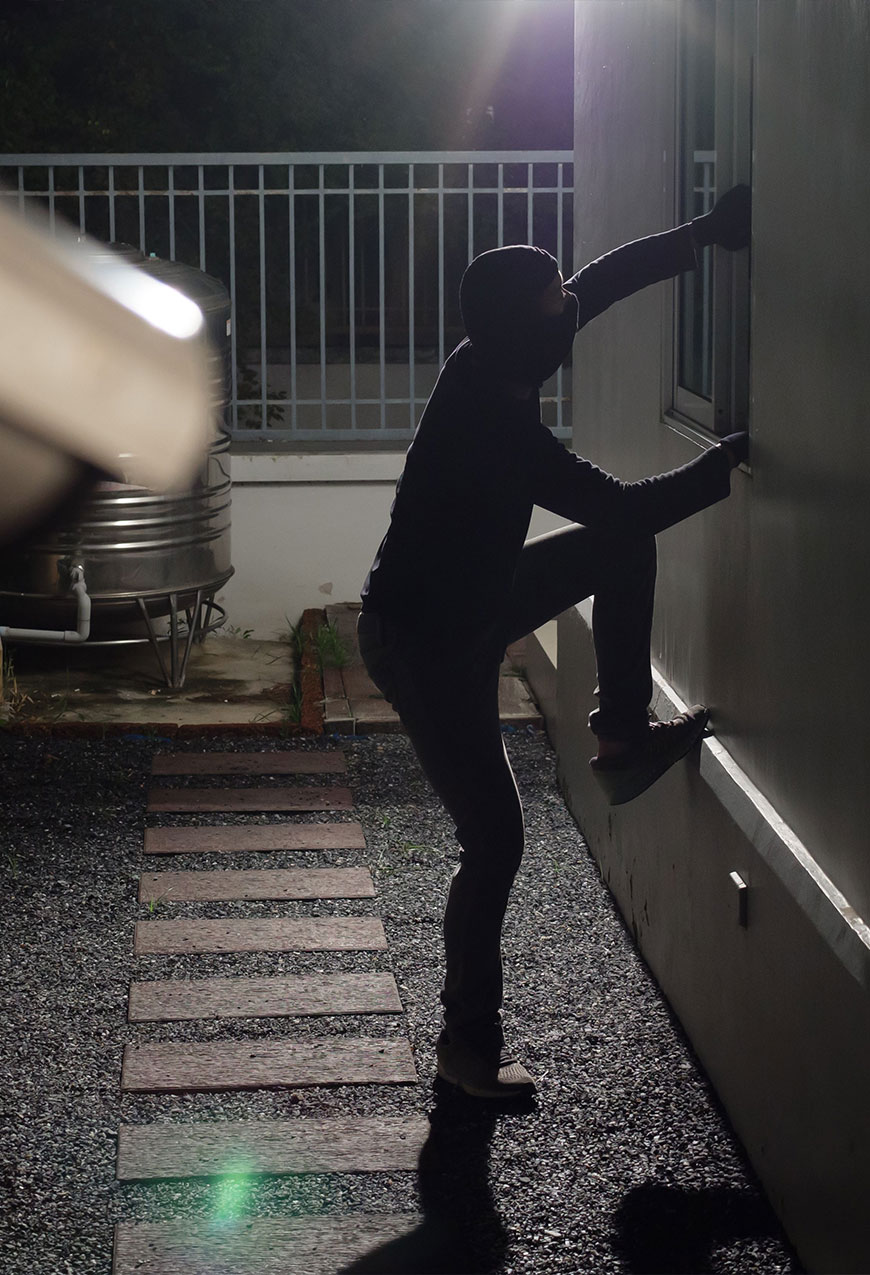Additional Links

Experienced St. Louis Burglary Lawyers Fighting for Your Freedom
Missouri law defines burglary as entering or remaining unlawfully in a dwelling, commercial building, or other structure with the intent to commit a crime. Whether you’re facing charges for breaking into a house, apartment, or other building, a conviction could limit your freedom, harm your career, and damage your reputation.
When you call Combs Waterkotte about a burglary charge that you’re facing in St. Louis, it’s easy to feel overwhelmed. We understand and we stand by you from the moment you contact us.
We help people just like you when facing life-altering criminal charges. Speak to a St. Louis burglary defense lawyer today at (314) 900-HELP.

Our St. Louis criminal defense lawyers are well-versed in crafting effective burglary defenses. One of our lawyers is a former prosecutor with extensive knowledge of the tactics of the opposing side. We have the resources and the skills to put together a winning defense for you.
Don’t delay. The sooner you begin to build your defenses, the better. Call us today for a free consultation, and let’s get started on defending your future.
Missouri Burglary Laws
Being familiar with the burglary laws of Missouri is essential when preparing yourself for the defense of the charges against you. The state of Missouri defines burglary (also known as Unlawful Entry) under Missouri Revised Statutes, §569.160, and §569.170, distinguishing between first-degree and second-degree burglary. The degree of charge varies based on the presence of a weapon, harm to others, and intent.
First-Degree Burglary (§569.160)
The first-degree burglary charge is the more serious of the two. Under current Missouri law, a person commits first-degree burglary if they:
- Unlawfully enter or remain in a building with the intent to commit a crime therein, and:
- Are armed with explosives or a deadly weapon
- Cause or threaten physical injury to another person
- Know another person is present in the building
This offense is classified as a Class B felony, with punishments ranging from 5 to 15 years in prison.

Second-Degree Burglary (§569.170)
Second-degree burglary is committed by unlawfully entering a building, whether occupied or unoccupied, with the intent to commit a crime, but without the aggravating factors associated with first-degree burglary.
This offense is classified as a Class D felony, punishable by:
- Up to 7 years in prison
- Fines of up to $10,000
Common Misconceptions About Burglary Laws in St. Louis
Burglary is often confused with other crimes, such as robbery or trespassing. However, a burglary conviction doesn’t require the commission of a crime, merely the intent to commit one. For instance, entering a property without permission with the aim of stealing something—even if nothing is taken—constitutes burglary.
At Combs Waterkotte, we collect all the precise details of your case to discover inconsistencies in the prosecution’s story and help safeguard your rights.
Collateral Consequences of a Burglary Conviction in St. Louis
For others, the consequences of a prison sentence for burglary don’t end when you come home. You might also have to contend with:
- Loss of Civil Rights: You can lose the right to vote, to serve on a jury, to own a firearm, and other civil rights as a result of a felony conviction
- Job Issues: It’s hard to get a decent paying job since most employers now do background checks
- Reputational Damage: A criminal record can harm your personal and professional relationships
These collateral consequences make it even more critical to fight burglary charges aggressively.
Fighting a Burglary Charge in St. Louis
Facing a charge of burglary can feel very intimidating, especially if you have never had any prior experience with the criminal justice system. At Combs Waterkotte, we will guide you through criminal prosecution from its inception through to your final resolution.
We will explain every step of the process to you so that you are never left in the dark as to what is going on, and so that you may assist us in achieving the best possible outcome for your case. We will tirelessly protect your freedoms and constitutional rights.
1. Arrest and Booking
The process begins when law enforcement arrests and books the accused. This typically involves:
- Being taken into custody
- Fingerprinting and photographing
- Filing formal charges based on the evidence available
Do not say anything to a policeman or any law enforcement officer without a lawyer present. Anything you say to them can and will be used against you.
2. Initial Court Appearance
After you are arrested, you will be arraigned on the charges, where you will hear the felony or misdemeanor charges against you and enter a plea of guilty, not guilty, or no contest. The lawyer for the accused may then ask the judge to:
- Reduce bail or release you on your own recognizance
- Dismiss the charges early if they lack sufficient evidence
3. Pre-Trial Preparation
The pre-trial phase is critical to your defense. Your attorney will:
- Investigate the Evidence: Examining police reports, witness statements, and any physical evidence
- File Pre-Trial Motions: Such as a motion to suppress illegally seized evidence or to dismiss the charges
- Forge Defensive Tactics: Personalized to your case, these might include proving an alibi, rebutting intent, or showing the absence of evidence
A thorough understanding of how evidence is gathered, handled, and presented in court is essential to building a strong defense.
4. Plea Bargaining (Optional)
In some cases, the prosecution offers a plea agreement, a deal to plead guilty to a lesser charge in return for a lesser penalty. Your lawyer will:
- Assess whether accepting a plea deal is in your best interest
- Negotiate with the prosecution to secure the most favorable terms
5. Trial
If your case goes to trial, the prosecution must prove that you committed the crime beyond a reasonable doubt. According to the Legal Information Institute, reasonable doubt “is the legal burden of proof required to affirm a conviction in a criminal case. In a criminal case, the prosecution bears the burden of proving that the defendant is guilty beyond all reasonable doubt. This means that the prosecution must convince the jury that there is no other reasonable explanation that can come from the evidence presented at trial.” When your case goes to trial, your lawyer will:
- Cross-examine witnesses and challenge the prosecution’s evidence
- Present evidence and witnesses to support your defense
- Deliver compelling arguments to the judge or jury to secure an acquittal
6. Sentencing or Acquittal
If you are found guilty, then you will be sentenced, wherein your punishment is given by the court. If you are found not guilty, then you will be freed, and the case is over.
7. Post-Conviction Relief (If Necessary)
If convicted, you may still have options, such as:
- Filing an appeal to challenge legal errors made during the trial
- Seeking sentence reductions or alternative sentencing programs
Common Defense Strategies for Burglary Charges in St. Louis
A good defense can be the difference between a guilty verdict and either dismissal or a reduction of charges. At Combs Waterkotte we craft our strategy around the facts of your particular situation and base it on case law-proven strategies to attack the prosecution's case and protect your constitutional rights.
Alibi Defense
One of the easiest defenses is to show you weren’t in the general vicinity of the scene of the crime alleged to have occurred. Evidence might include:
- Witness testimony confirming your whereabouts
- GPS or phone records showing you were in a different location
Lack of Intent to Commit a Crime
For burglary, the prosecution needs to prove that you had formed the intent to commit a crime at the time you entered the building. If we can show that you were there for a lawful reason, such as to collect your belongings or by mistake, that absence of intent can be used as a defense.
Consent Defense
If you had permission to enter the property, such as the owner granting you access, lack of permission cannot be used as grounds for unlawful entry.
Coercion or Duress
Sometimes people commit burglary while threatened or under duress from another person. If we can show that you acted under duress, such as under threat of death or serious injury to you or a loved one, we can argue that you should not be held accountable.
Challenging Unlawful Search and Seizure
If police violated your constitutional rights in the course of their investigation, such as by executing a search without a warrant or probable cause, we can file a motion to suppress the evidence. This weakens the prosecution’s case significantly.
Building a Defense That Works for You
Each burglary case is different, and the defense takes into account the specific details of your situation. At Combs Waterkotte, our lawyers thoroughly investigate the facts to construct an individualized and aggressive defense to achieve the best available result under the law for your case.
Navigating the Law Alone? Here’s Why You Shouldn’t
If you’ve been charged with burglary, the attorney that represents you could mean the difference between your future and your very life hanging in the balance. Without legal representation, you’ll face the full weight of the criminal justice system on your own. Prosecutors will present what they deem compelling evidence against you while pushing for the maximum penalty. Our attorneys serve as a shield and as your voice throughout the process.


























